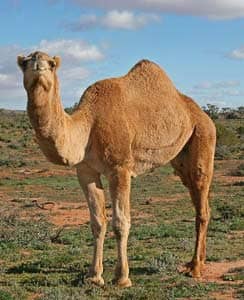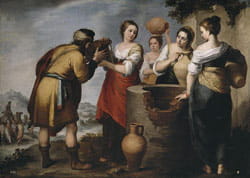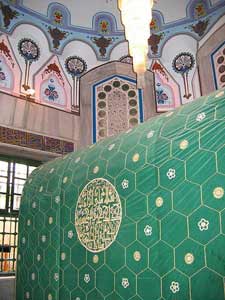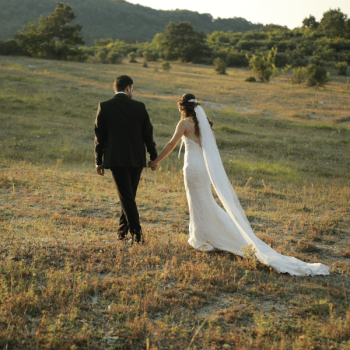 So our servant takes ten camels laden with treasures to Abraham’s hometown. He lands in the city of Nahor in Aram Naharaim. He finds a watering hole and gets the camels to lie down. So now he has to think of a plan. He says to G-d, “Look, here is what I will do. The first girl who is kind enough to offer me water and water for all ten of my camels will be the one.” Why such a condition? Well, Abraham is known for his chesed, loving-kindness. His son is known for his gevurah, severity. Isaac’s wife had to have a measure of kindness to help balance out the family. Chesed (loving-kindness) plus gevurah (severity) all in the right measure make tiferet (balance, beauty). Just as he finishes this idea in his head, little Rivka comes out and offers him some water. She was a beauty, however, several rabbis have calculated that she was only three at this time! She gives the servant water and then offers to water the camels for him. Let’s just get this straight for a minute. Do we realize how much a camel can drink? Between 30-50 gallons! Yeah, our little Rivka had her work cut out for her.
So our servant takes ten camels laden with treasures to Abraham’s hometown. He lands in the city of Nahor in Aram Naharaim. He finds a watering hole and gets the camels to lie down. So now he has to think of a plan. He says to G-d, “Look, here is what I will do. The first girl who is kind enough to offer me water and water for all ten of my camels will be the one.” Why such a condition? Well, Abraham is known for his chesed, loving-kindness. His son is known for his gevurah, severity. Isaac’s wife had to have a measure of kindness to help balance out the family. Chesed (loving-kindness) plus gevurah (severity) all in the right measure make tiferet (balance, beauty). Just as he finishes this idea in his head, little Rivka comes out and offers him some water. She was a beauty, however, several rabbis have calculated that she was only three at this time! She gives the servant water and then offers to water the camels for him. Let’s just get this straight for a minute. Do we realize how much a camel can drink? Between 30-50 gallons! Yeah, our little Rivka had her work cut out for her.
Our servant knows that this girl is Abraham’s kin, so he pulls out some jewelry and puts it on her and asks if he can stay at her house. Her brother, Laban (remember that name for later), sees her and takes them back to the house. The family is anxious to feed this man and hear what is going on. Our faithful servant tells Rivka’s family what the deal is, recounting the story at the well for them. The family chats with the servant for a bit and they all agree that Rivka is to go.
 Rivka heads back to Israel/Canaan with the servant. They get close to the homestead and Rivka sees Isaac for the first time. There is some debate on her age at this point but suffice to say she is a teenager. Did I mention that he is in his 40s now? Regardless, this is the first case of love at first sight. Rivka literally nearly falls off her camel when she sees him! Isaac brings her to his mother’s tent, which will now be hers. He marries her, sleeps with her, loves her, and is comforted in the loss of his mother. Why is he now comforted? Rashi tells us there were three miracles that surrounded Sarah and her tent, all of which reappear with Rivka. Isaac knows she is the right one for him.
Rivka heads back to Israel/Canaan with the servant. They get close to the homestead and Rivka sees Isaac for the first time. There is some debate on her age at this point but suffice to say she is a teenager. Did I mention that he is in his 40s now? Regardless, this is the first case of love at first sight. Rivka literally nearly falls off her camel when she sees him! Isaac brings her to his mother’s tent, which will now be hers. He marries her, sleeps with her, loves her, and is comforted in the loss of his mother. Why is he now comforted? Rashi tells us there were three miracles that surrounded Sarah and her tent, all of which reappear with Rivka. Isaac knows she is the right one for him.
Chapter 25 opens with Abraham’s remarriage to a woman names Keturah. Who is she? Turns out, according to Rashi, that she is actually Hagar, who has behaved since she left Abraham and Sarah. The Hebrew shoresh (root) for her name is Ketoret -- her actions were beautiful. They have six children together. Abraham sets them all up with what they need and sends them east away from Isaac. Abraham dies at 175 years old, and the brothers who haven’t spoken in years, Isaac and Ishmael, come back together in love to bury their father.
 The end of this parsha is mainly progeny of Abraham. Ishmael dies at 137 leaving many children.
The end of this parsha is mainly progeny of Abraham. Ishmael dies at 137 leaving many children.
In this parsha we talk about loving-kindness and severity and the need for balance. Anything in its essential form is not complete, according to the Kabbala. Chesed (loving-kindness) alone is not successful. For example, consider how foolish is the parent who won’t discipline a child running with scissors because she doesn’t want to stifle the child or make him feel sad. It’s not a complete picture. Not only this, but where does that complete kindness come from? Like Ishmael who was seeking something selfish or like Abraham who believed we were all deserving and equal? Sarah balanced Abraham out just as we will learn in the coming parshot how Rivka balances Yitzhak out.
Parshat Chayei Sarah from G-dcast.com
More Torah cartoons at www.g-dcast.com





